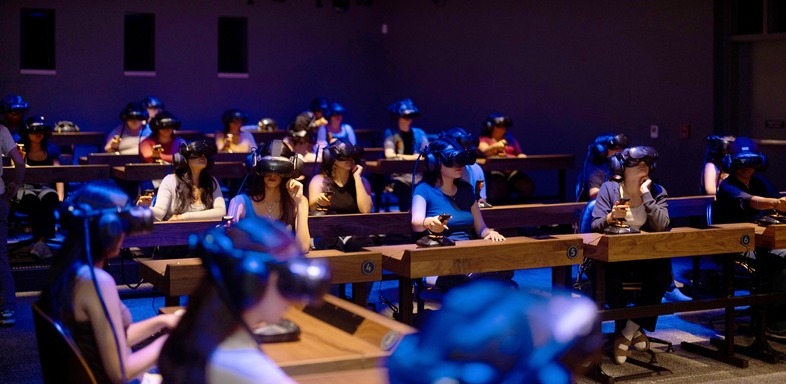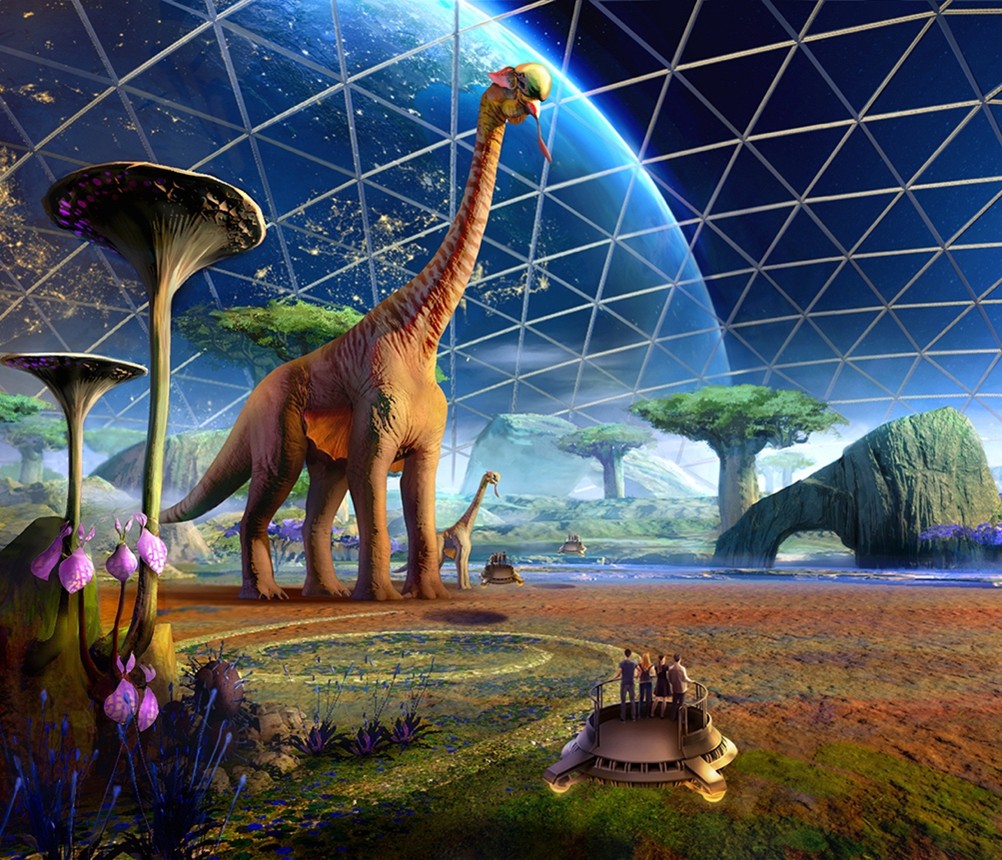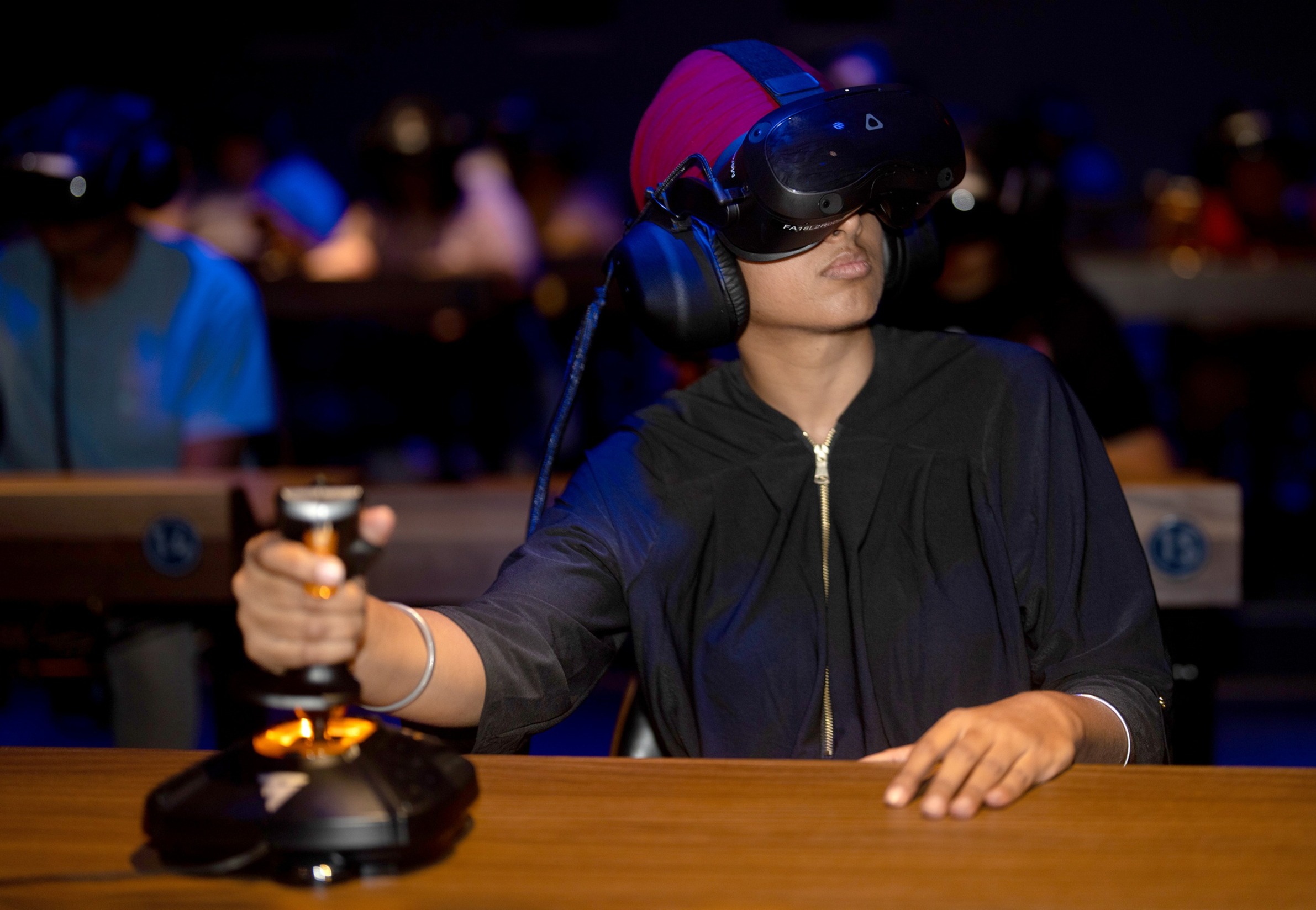Merced College: Dreamscape Learn Offers Immersive Learning Experiences

Stepping into the world of virtual reality is easy at Merced College’s Dreamscape Learn virtual reality (VR) lab. Students strap in and explore an intergalactic wildlife sanctuary, feeling the wind as their pod navigates the refuge and encountering extraterrestrial creatures. Or, they might shrink down to the size of a molecule and travel through the intricate structures of a human cell. At the VR lab, students don’t just read about science—they experience it.
Merced College is pioneering this revolutionary approach to education as one of the first California Community Colleges to implement Dreamscape Learn. Designed to engage students in an unprecedented way, the lab uses state-of-the-art simulations to boost comprehension, retention, and enthusiasm for learning. By merging cinematic storytelling with interactive lessons, this innovative facility reshapes traditional education, offering students hands-on experiences once unimaginable in a standard classroom.
Inspiration, Vision, and Development
The Dreamscape Learn lab was born from a bold vision: to revolutionize learning through immersive technology. Recognizing VR’s growing role in education and workforce training, Merced College sought tools that would both engage students and deepen their understanding of complex subjects. VR goes beyond lectures and textbooks to make learning an active, experiential process.
This initiative reflects Merced College’s commitment to innovation and student success. By embracing VR and integrating it into classes, the college aims to improve retention, foster curiosity, and prepare students for a technology-driven future. The VR lab aligns with the college’s mission to deliver high-quality, accessible education that meets evolving student and workforce needs.

Students learn biology by exploring an alien world
at the Dreamscape Learn virtual reality lab.
“Merced College is committed to being one of the most innovative community colleges in the nation, and to providing cutting-edge educational opportunities for all of our students,” President Chris Vitelli said. “With Dreamscape Learn, we are bringing a unique, one-of-a-kind interactive and dynamic new learning experience to students that will transform how we approach teaching and learning moving forward.”
To bring this vision to life, Merced College leaned on the experience and expertise of Arizona State University (ASU), which had partnered with Dreamscape Learn to develop the VR learning technology and content, particularly in biology. Today, biology at Merced College includes virtual labs that give students an interactive, hands-on way to explore scientific concepts.
Program Implementation
Dreamscape Learn is currently integrated into Merced College’s General Biology course. The VR-based simulations enhance traditional instruction with cinematic virtual experiences. Instead of reading about cell structures or ecosystems, for instance, students can step inside a human cell or traverse a virtual rainforest to study biodiversity firsthand. These experiences complement textbook and lecture content through experiential learning. Faculty collaborate with instructional designers to ensure that the VR components align with course objectives, providing a balanced and effective mix of traditional and technology-driven instruction.

Hands-on virtual exploration helps students feel like real
scientists, leading to increased engagement and learning.
Outcomes and Impact
Students consistently express enthusiasm for the experiences offered by the VR lab. Many describe it as a game-changer, making complex scientific concepts more accessible and engaging.
Freshman liberal studies and studio arts major Amina Housini had no idea she’d be among the first to experience a VR-driven education. She did know she’d dropped out of biology before, because she found it boring. “I enjoy biology so much more now,” Housini said. “We’re scientists doing experiments on this alien beach. . . . You have to touch things and look for things. It makes you feel like you’re really doing something. Everything about it catches your interest.” About working in the Dreamscape Learn lab, Housini added, “Everyone around you is doing the same thing. You don’t feel alone while learning [virtually]. You might be having trouble yourself, but you can talk to anyone on your team about anything.”
Although formal assessments of long-term academic outcomes are still underway, early observations suggest positive trends in student engagement and comprehension. Faculty have reported improved understanding and participation in courses utilizing the lab. Similar programs at institutions like ASU have shown increased student performance, motivation, and knowledge retention—trends Merced College is beginning to see as well.
Challenges and Solutions
As with any innovative initiative, scaling Dreamscape Learn beyond its initial launch presents significant challenges. One of the most pressing issues is integrating VR experiences across additional disciplines. While the existing VR simulations have already transformed student engagement in science education, replicating this success in other fields requires new, customized content that aligns with diverse instructional goals.
To address this, Merced College is investing in internal capacity-building. The college is actively training its educational technology specialists in industry-standard development tools such as Unity and other VR design platforms. This strategic move empowers in-house staff to collaborate with faculty and create bespoke VR scenarios tailored to a variety of academic areas—from humanities to career technical education.
By developing content internally, the college not only ensures better alignment with curricula but also increases flexibility and cost efficiency. This approach positions Merced College to lead in immersive instructional design and sets the stage for broader, sustainable VR integration across campus.
Future Plans
Several new initiatives are underway to expand and elevate Dreamscape Learn’s impact at Merced College. A key priority is the in-house development of custom VR content, which will enable greater alignment with instructional needs across a broader range of academic disciplines. Plans include the creation of instructor-led scenarios, allowing faculty in fields such as the humanities and social sciences to deliver engaging lectures and learning experiences tailored to their content areas.
At the same time, the college is focused on scaling the use of Dreamscape Learn within STEM and other disciplines, leveraging newly developed VR platforms from ASU. These next-generation modules will support immersive instruction in subjects such as chemistry and art history, building on the success of the biology simulations. By combining custom-built content with expanded access to cutting-edge educational tools, Merced College is positioning Dreamscape Learn as a flexible, interdisciplinary resource that will continue to grow in scope and impact for years to come.
An Evolution in Learning
Dreamscape Learn represents a groundbreaking shift in education at Merced College, giving students a unique opportunity to interact with course material in meaningful ways. Through forward-thinking partnerships, strategic planning, and a commitment to student success, the college has integrated cutting-edge VR technology into its curriculum to enhance learning outcomes.
As higher education continues to evolve, technologies like VR will play an increasingly important role. Merced College encourages other institutions to explore similar innovations, leveraging emerging tools to create dynamic and engaging learning environments for the next generation of students.
Lead image: The Dreamscape Learn lab at Merced College uses cinematic virtual reality to bring biology lessons to life.
James Leonard is Director, Communications and External Relations, at Merced College in Merced, California.
Opinions expressed in Member Spotlight are those of the author(s) and do not necessarily reflect those of the League for Innovation in the Community College.










